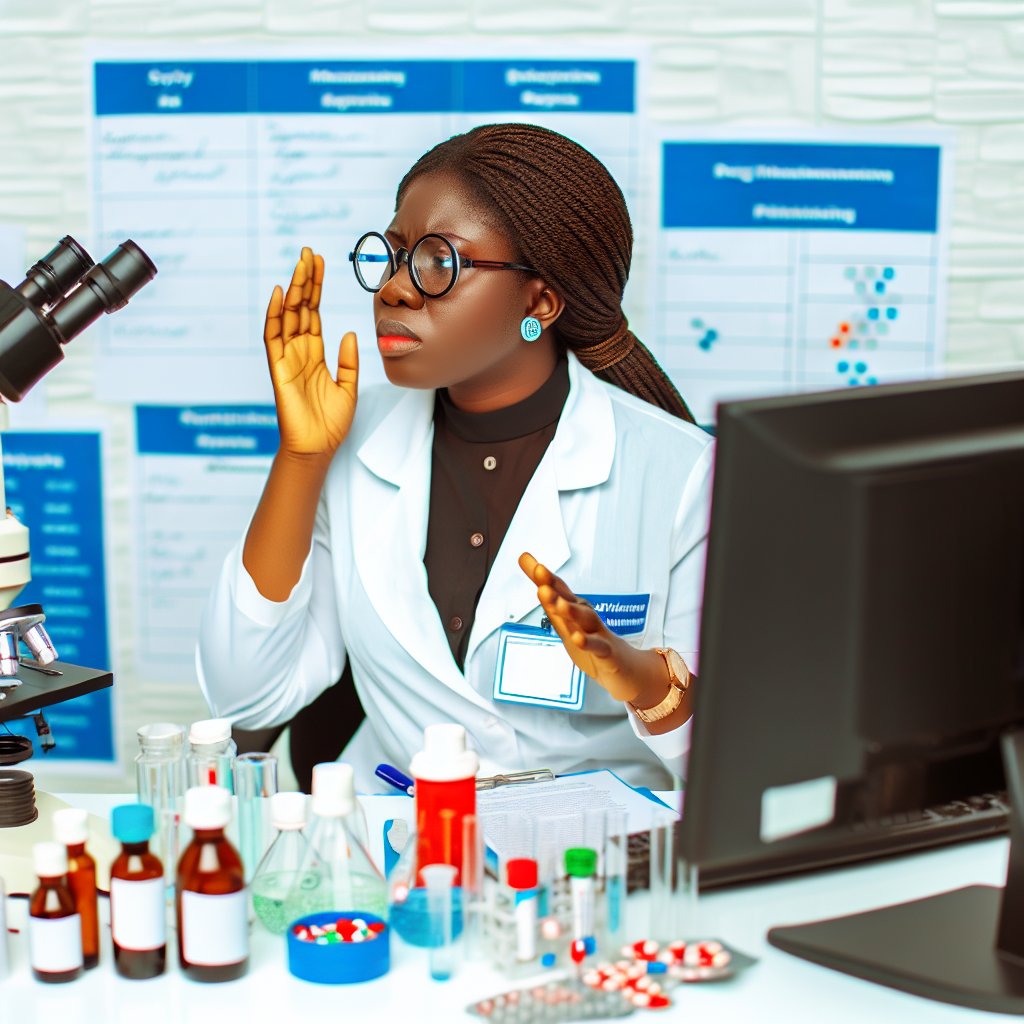Introduction:
Pharmacovigilance: Pharmacovigilance is the science and activities related to the detection, assessment, understanding, and prevention of adverse effects or any other drug-related problems.
Importance of pharmacovigilance in healthcare: Pharmacovigilance plays a crucial role in ensuring patient safety by monitoring the safety of medicines and identifying any potential risks associated with their use.
The role of clinical pharmacists in pharmacovigilance:
Pharmacovigilance is a crucial aspect of healthcare that focuses on monitoring and evaluating the safety of medications.
Clinical pharmacists play a vital role in this process by actively contributing to the detection and prevention of adverse drug reactions.
Monitoring and reporting adverse drug reactions:
- Clinical pharmacists are trained to recognize and assess adverse drug reactions in patients.
- They play a key role in monitoring the safety of medications by collecting data, analyzing trends, and reporting any adverse events to regulatory authorities.
Providing drug information to healthcare professionals:
- Clinical pharmacists serve as experts in medication management, providing valuable drug information to healthcare professionals such as physicians, nurses, and other members of the healthcare team.
- They offer guidance on drug interactions, side effects, and appropriate medication use.
Participating in drug safety initiatives and programs:
- Clinical pharmacists actively participate in drug safety initiatives and programs aimed at improving medication safety and reducing the risk of adverse events.
- They collaborate with other healthcare professionals to develop strategies for enhancing drug safety practices.
In Nigeria, clinical pharmacists play a critical role in pharmacovigilance efforts to ensure the safe and effective use of medications.
By monitoring and reporting adverse drug reactions, providing drug information to healthcare professionals, and participating in drug safety initiatives, clinical pharmacists contribute to improving patient outcomes and enhancing the overall quality of healthcare delivery.
Through their expertise and dedication, clinical pharmacists help to safeguard patient health and well-being by ensuring the appropriate use of medications and monitoring for any potential adverse effects.
Collaboration with other healthcare professionals:
Clinical pharmacists in Nigeria play a crucial role in collaborating with other healthcare professionals to ensure patient safety and effective medication management.
By working closely with physicians and nurses, clinical pharmacists can identify and report adverse drug reactions promptly.
This collaboration helps in detecting and preventing potential harm to patients from medications.
Moreover, clinical pharmacists participate in multidisciplinary teams for patient care and medication safety.
By contributing their expertise in pharmacovigilance, they can provide valuable insights into the safe use of medications.
This approach enhances patient outcomes and promotes overall medication safety in healthcare settings.
As part of their role, clinical pharmacists also provide education and training on pharmacovigilance to other healthcare professionals.
By sharing their knowledge and experience in monitoring drug safety, they empower colleagues to recognize and report adverse events effectively.
This educational aspect of their work is essential in promoting a culture of pharmacovigilance and ensuring the safe use of medications across healthcare teams.
The collaboration of clinical pharmacists with other healthcare professionals is vital in pharmacovigilance.
By working together, they can enhance patient safety and improve medication management.
They contribute to better healthcare outcomes in Nigeria.
- Working closely with physicians and nurses to identify and report adverse drug reactions
- Participating in multidisciplinary teams for patient care and medication safety
- Providing education and training on pharmacovigilance to other healthcare professionals
Explore Further: Postgraduate Opportunities in Pharmaceutics Nigeria
Challenges Faced by Clinical Pharmacists in Pharmacovigilance
Pharmacovigilance is a critical component of healthcare that focuses on the detection, assessment, understanding, and prevention of adverse effects or any other drug-related problems.
Clinical pharmacists play a crucial role in pharmacovigilance by monitoring the safety and effectiveness of medications used by patients.
Lack of Awareness and Training on Pharmacovigilance
One of the significant challenges faced by clinical pharmacists in Nigeria is the lack of awareness and adequate training on pharmacovigilance.
Many pharmacists may not be fully aware of the importance of reporting adverse drug reactions and understanding the processes involved in pharmacovigilance.
This leads to underreporting of adverse events, missing out on valuable data that could improve patient safety.
Limited Resources and Infrastructure for Reporting Adverse Drug Reactions
Another challenge is the limited resources and infrastructure available for reporting adverse drug reactions.
Clinical pharmacists often struggle with accessing the necessary tools and support systems to report adverse events effectively.
This lack of resources hinders their ability to collect, record, and analyze data on drug safety, ultimately impacting patient care outcomes.
Difficulty in Obtaining Timely and Accurate Information on Drug Safety
Clinical pharmacists also face challenges in obtaining timely and accurate information on drug safety.
In a fast-paced healthcare environment, pharmacists may encounter difficulties in keeping up-to-date with the latest drug safety information, including new side effects or drug interactions.
This lack of real-time data can pose risks to patient safety and impact the quality of pharmaceutical care provided.
Addressing the challenges faced by clinical pharmacists in pharmacovigilance is crucial to improving patient safety and optimizing medication therapy.
By increasing awareness, providing adequate training, and enhancing resources and infrastructure for reporting adverse drug reactions, clinical pharmacists can enhance their role in pharmacovigilance and contribute to a safer healthcare system in Nigeria.
Uncover the Details: Nigerian Medical Chemistry Journals and Publications
Strategies to Improve Pharmacovigilance in Nigeria:
This involves enhancing the infrastructure and framework for monitoring and reporting adverse drug reactions.
Facilitating communication and information sharing to ensure timely and accurate reporting of drug safety issues.
This includes workshops, seminars, and online courses to enhance knowledge and skills in drug safety monitoring.
- Strengthening pharmacovigilance systems and regulations
- Increasing collaboration between healthcare professionals and regulatory agencies
- Providing continuous education and training on pharmacovigilance to clinical pharmacists and other healthcare professionals
Discover More: Collaboration Opportunities in Nigeria’s Pharmaceutical Sector

Pharmacovigilance in Nigeria
Pharmacovigilance is a crucial aspect of healthcare that focuses on monitoring and evaluating the safety of medications.
Clinical pharmacists play a significant role in pharmacovigilance in Nigeria, ensuring the safe and effective use of drugs in the population.
Transform Your Career with Expert Guidance
Get personalized mentorship consulting that’s tailored to your unique path. Our expert advice is actionable and exclusive.
Get StartedOpportunities for Clinical Pharmacists in Pharmacovigilance
Career Advancement and Specialization in Drug Safety and Surveillance
One of the key opportunities for clinical pharmacists in pharmacovigilance is the chance to advance their careers and specialize in drug safety and surveillance.
By focusing on this aspect of pharmacy practice, pharmacists can deepen their knowledge and skills in monitoring adverse drug reactions and ensuring patient safety.
Contributing to Public Health by Ensuring the Safe Use of Medications
Clinical pharmacists have a direct impact on public health by participating in pharmacovigilance activities.
By identifying, reporting, and managing adverse drug reactions, pharmacists contribute to the safe use of medications in the community.
This proactive approach helps prevent harm and improve patient outcomes.
Enhancing the Role of Clinical Pharmacists in Healthcare Teams
Participating in pharmacovigilance allows clinical pharmacists to collaborate with other healthcare professionals and enhance their role in multidisciplinary teams.
By providing valuable insights into drug safety and monitoring, pharmacists can contribute to informed decision-making and improve patient care.
This interdisciplinary approach fosters a culture of patient safety and quality in healthcare settings.
Pharmacovigilance presents unique opportunities for clinical pharmacists in Nigeria to broaden their scope of practice, contribute to public health, and enhance their role in healthcare teams.
By actively engaging in drug safety and surveillance activities, pharmacists can make a meaningful impact on patient care and promote the safe use of medications in the population.
Uncover the Details: Studying Pharmaceutical Technology: What to Expect
Importance of Pharmacovigilance in Healthcare
Pharmacovigilance plays a critical role in healthcare by ensuring medication safety and monitoring drug effectiveness.
Clinical pharmacists are instrumental in this process, as they possess the expertise to detect and manage adverse drug reactions.
As healthcare professionals, it is imperative to prioritize pharmacovigilance in patient care and drug management to enhance overall healthcare quality.
By actively engaging in pharmacovigilance activities, clinical pharmacists can contribute significantly to the improvement of medication safety practices in Nigeria and beyond.
It is crucial that all healthcare professionals work collaboratively to promote vigilance in drug therapy and patient safety.
Let us join hands in advocating for the importance of pharmacovigilance and ensuring that every patient receives safe and effective medication therapy.
Additional Resources
(PDF) An evaluation of the knowledge and perceptions of pharmacy …
Improving pharmacy practice through public health programs …




